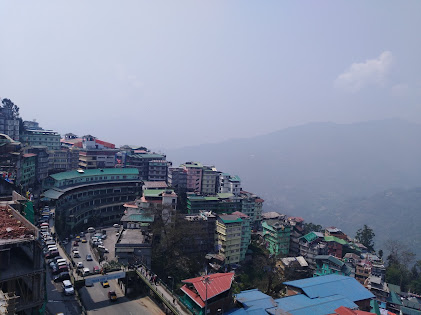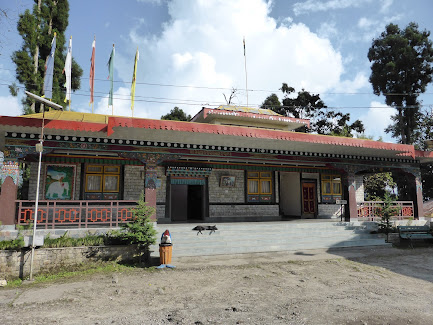The Very Best and Worst time to Visit Gangtok - When to Go and What to See in 2025
Nestled in the Himalayas, Gangtok, the capital of the Indian state of Sikkim, is a mesmerizing hill station known for its pristine natural beauty, rich culture, and stunning views of the snow-capped mountains. Whether you're an adventure seeker, a nature lover, or someone seeking tranquillity, Gangtok has something to offer. To make the most of your visit, it's crucial to understand the best and worst times to explore this enchanting destination.
The Very Best and Worst time to Visit Gangtok - When to Go and What to See
Best Time to Visit Gangtok
Spring (March to May)
March: Spring is a delightful time to visit Gangtok.
The weather is pleasant, and the blooming flowers, including rhododendrons and
orchids, add vibrant colors to the landscape. You can explore the city and its
nearby attractions comfortably.
April: This month sees Gangtok adorned with colorful
flowers and lush greenery. The temperatures are mild, making it ideal for
outdoor activities like trekking and sightseeing.
May: As spring progresses, Gangtok experiences
pleasant weather with clear skies and a gentle breeze. It's an excellent time
for nature walks, photography, and exploring monasteries.
Autumn (September to November)
September: Autumn in Gangtok brings clear skies and
comfortable temperatures. The views of the Kanchenjunga, the third-highest peak
in the world, are breathtaking. It's a great time for trekking and adventure
activities.
October: This month is considered the best time to
visit Gangtok. The weather is crisp, and the landscapes are incredibly scenic.
Don't miss the vibrant Durga Puja celebrations.
November: As autumn progresses, temperatures start to
cool down, but it's still an excellent time to explore Gangtok and its
surroundings. The views of snow-capped peaks are stunning.
---------------------------------------------------------------------------------------------------------------
Worst Time to Visit Gangtok
Monsoon (June to September)
June: Monsoon season in Gangtok begins in June,
bringing heavy rainfall. The incessant rains can lead to landslides and road
closures, making it challenging for outdoor activities.
July: July continues to see heavy rainfall, and
trekking or outdoor adventures may not be advisable. Landslides are a common
occurrence during this time.
August: Monsoon peaks in August, with continuous rain
and high humidity. Many attractions and trekking routes may be inaccessible due
to safety concerns.
Winter (December to February)
December: While winter in Gangtok is picturesque, it
can be extremely cold. Snowfall is common in higher altitudes, but the
temperatures can be uncomfortable for travelers.
January: The coldest month in Gangtok, January
experiences freezing temperatures. While it offers a unique snow-covered charm,
outdoor activities are limited.
February: Winter persists in February, and the cold
weather can deter travelers seeking warmth and comfort.
---------------------------------------------------------------------------------------------------------------
Major Places of Interest in Gangtok
Rumtek Monastery - The Seat of the Karmapa
Overview: Rumtek
Monastery, also known as the Dharma Chakra Centre, is one of the most important
and largest monasteries in Sikkim.
Major Attractions:
- Golden
Stupa: Admire the 16th Karmapa's Golden Stupa, a sacred and intricate
structure.
- Spiritual
Retreat: Attend teachings and meditation sessions to experience
Buddhist culture.
- Scenic
Views: Enjoy panoramic views of the surrounding hills and the Gangtok
cityscape.
Tsomgo Lake - A Tranquil Gem
Overview: Tsomgo Lake,
also known as Changu Lake, is a stunning high-altitude glacial lake located on
the eastern side of Gangtok.
Major Attractions:
- Natural
Beauty: Be captivated by the crystal-clear waters and the reflection
of surrounding mountains.
- Yak
Rides: Enjoy a yak ride along the lake and soak in the serene
atmosphere.
- Baba
Harbhajan Singh Temple: Pay your respects at this temple dedicated to
a revered army soldier.
Nathu La Pass - A Historical Trade Route
Overview: Nathu La Pass,
located on the Indo-China border, is a historic trade route that offers
breathtaking vistas.
Major Attractions:
- Border
Crossing: Visit the Indo-China border and witness the Indian and
Chinese soldiers' flag-lowering ceremony.
- High
Altitude: Experience the thrill of being at an altitude of 14,140
feet.
- Silk
Route: Explore the ancient Silk Route and the yak safari options.
Ganesh Tok - A Hilltop Temple
Overview: Ganesh Tok is a
small hilltop temple dedicated to Lord Ganesha, offering panoramic views of
Gangtok.
Major Attractions:
- Hilltop
Temple: Seek blessings at the temple and enjoy its peaceful ambiance.
- Spectacular
Views: Capture breathtaking views of Gangtok and the snow-capped
mountains.
- Nature
Walk: Take a short walk through the lush forests and enjoy the
surrounding greenery.
Enchey Monastery - A Sacred Retreat
Overview: Enchey Monastery
is an ancient and revered monastery nestled in the midst of pine forests.
Major Attractions:
- Religious
Significance: Explore the intricately designed monastery with its
religious artifacts.
- Peaceful
Environment: Enjoy the tranquility and the serene atmosphere
surrounding the monastery.
- Festivals:
Participate in the annual Chaam dance festival celebrated here.
MG Marg - The Heart of Gangtok
Overview: MG Marg is the
main street in Gangtok, bustling with shops, restaurants, and cultural events.
Major Attractions:
- Shopping:
Stroll along the pedestrian-only street and shop for handicrafts,
souvenirs, and local goods.
- Food
and Entertainment: Savor local and international cuisines at the many
cafes and restaurants.
- Cultural
Shows: Enjoy cultural events, live music, and street performances in
the evening.
Banjhakri Falls and Energy Park - Natural Beauty
Overview: Banjhakri Falls
and Energy Park is a nature park with a waterfall and themed gardens.
Major Attractions:
- Waterfall:
Admire the cascading Banjhakri Falls surrounded by lush greenery.
- Themed
Gardens: Explore the energy park with themed gardens, sculptures, and
a forested area.
- Picnicking:
Enjoy a picnic in the park's serene surroundings.
Tashi Viewpoint - Stunning Sunrise Views
Overview: Tashi Viewpoint
offers panoramic views of the snow-capped peaks, including the Kanchenjunga
range.
Major Attractions:
- Sunrise
Views: Witness a breathtaking sunrise over the Himalayas on a clear
day.
- Photography:
Capture the stunning vistas, and take in the panoramic beauty.
- Tea
Stalls: Sip on hot tea or coffee from the local stalls while enjoying
the view.
Connectivity
By Air:
The nearest airport to Gangtok is Bagdogra Airport (IXB) in
West Bengal, which is well-connected to major Indian cities like Kolkata,
Delhi, and Mumbai. From Bagdogra, you can hire a taxi or take a helicopter ride
to Gangtok.
By Road:
Gangtok is well-connected by road to major cities in Sikkim
and neighboring states. You can hire taxis, private vehicles, or take state-run
buses to reach Gangtok from nearby cities like Siliguri and Darjeeling.
Gangtok, with its natural beauty, cultural richness, and warm hospitality, is a year-round destination. The best time to visit Gangtok largely depends on your preferences and the experiences you seek. Whether you prefer the vibrant blooms of spring, the clear skies of autumn, or the snowy landscapes of winter, Gangtok has something to offer in every season.
For up-to-date information, travel advisories, and bookings,
consider visiting the official Sikkim Tourism website here.
---------------------------------------------------------------------------------------------------------------
Related Reads:
- The Very Best and Worst time to Visit Nepal - When to Go and What to See
- The Very Best and Worst time to Visit Nainital - When to Go and What to See
- The Very Best and Worst time to Visit Rajasthan - When to Go and What to See
- The Very Best and Worst time to Visit Bhutan - When to Go and What to See
- The Very Best and Worst time to Visit Pondicherry - When to Go and What to See
- The Very Best and Worst time to Visit Munnar - When to Go and What to See
- The Very Best and Worst time to Visit Meghalaya - When to Go and What to See
- The Very Best and Worst time to Visit Shimla - When to Go and What to See
- The Very Best and Worst time to Visit Sikkim - When to Go and What to See






.jpg)




